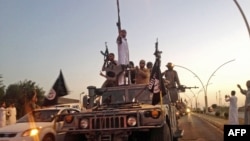Turkish authorities are bracing for an influx of refugees from the Iraqi city of Mosul, predicting as many as 300,000 could flee to Turkey once an assault begins in earnest to recapture the city from the militants of the Islamic State.
Officials say the scale will depend partly on the behavior of Shiite militias, who have been spearheading Iraqi government efforts to take back territory the militants seized in a lightning offensive last year.
With a mixture of hope and dread, Mosul’s mainly Sunni Muslim population is watching what is happening in the nearby town of Tikrit, which government forces are seeking to wrest from the Islamic State, also known as ISIL or ISIS.
Retribution by Iran-backed Shiite militiamen on Sunnis in Tikrit would likely encourage large numbers from Mosul to seek refuge in neighboring Turkey.
Tikrit offensive
More than 20,000 troops, mostly Shia militiamen, are taking part in the siege of Tikrit, which began two weeks ago. Only small numbers of Sunni fighters loyal to Baghdad are supporting the offensive.
The assault to take the larger northern city of Mosul is likely to be a far more complex and perilous operation.
The Tikrit offensive was paused Monday, with Iraqi commanders calling for more airstrikes to help them dislodge stubborn resistance from militants on the eastern side of the town.
The assault on Mosul could begin as early as next month. Pentagon officials in February predicted it would begin by April or May, a disclosure new Defense Secretary Ashton Carter said should not have been made.
Eye on Mosul
Turkish officials have been sending mixed signals about what role the country may play in the eventual effort to storm Mosul, at one time indicating that Turkish soldiers may participate.
Recently, Prime Minister Ahmet Davutoglu said the role would only be supportive and more from the sidelines.
“Turkey will not be a direct party to the heated conflict in Iraq or Syria. We will provide support for Mosul but will not become a party to clashes,” he told reporters last week.
Since the Turkish military last month evacuated dozens of its troops guarding an ancient Ottoman tomb inside Syria that was surrounded by Islamic State militants, the Turkish government has become more robust in condemning the jihadists and has shown signs of tightening security along the border to disrupt militants crossing to and from Syria.
Fully participating in the U.S.-led anti-Islamic State coalition, however, seems a remote possibility.
The Turkish government believes the toppling of Syrian President Bashar al-Assad should be the major priority.
On Monday, Turkish Foreign Minister Mevlüt Çavuşoğlu was highly critical of U.S. Secretary of State John Kerry for his recent comment that eventually there would have to be negotiations with Assad, if the four-year-long civil war in Syria is to end.
“What you are going to negotiate with Assad?” Çavuşoğlu asked. “What will you negotiate with a regime that killed more than 200,000 people and has used chemical weapons? What has come out of the negotiations that have been held up until now?”
Çavuşoğlu was quoted by the state-run news agency Anadolu as saying.
Last month, the Turkish government agreed to participate in the U.S.-planned train and equip program to develop a proxy force of Syrian rebels to fight the Islamic State.
Turkish involvement
Turkish officials say they want proxy fighters to battle Assad as well. The Turks have also agreed to supply military equipment to the Iraqi army ahead of the Mosul assault.
Senior officials here say Turkey will not take part in air or ground operations, although Turkish military airports will be open for coalition warplanes needing to land in emergencies.
U.S. officials, who requested they not be identified for this article, say they are hopeful that Turkish intelligence will assist and provide both electronic and human intelligence on Islamic State formations in Mosul.
Turkey has long had a close affiliation with Mosul and traditionally wielded influence with Sunni tribal leaders in and around the city.
“We hope that they can help us reassure tribal leaders and to persuade them either to remain neutral in the battle for Mosul or even support and turn on the militants,” said a U.S. diplomat based in Istanbul.
He acknowledged there is alarm in Turkish government circles about the offensive against the Islamic State militants turning Iraq into a virtual Iranian satellite thanks to the role being played by Shiite militias.
Turkey already is hosting nearly 2 million Syrians. Measures on border security for refugees flowing in from Mosul, which has a population of 1.3 million, are underway. They include reportedly digging ditches to deter refugees from accidentally stumbling into border minefields and adding more guards along the frontier with Iraq.




